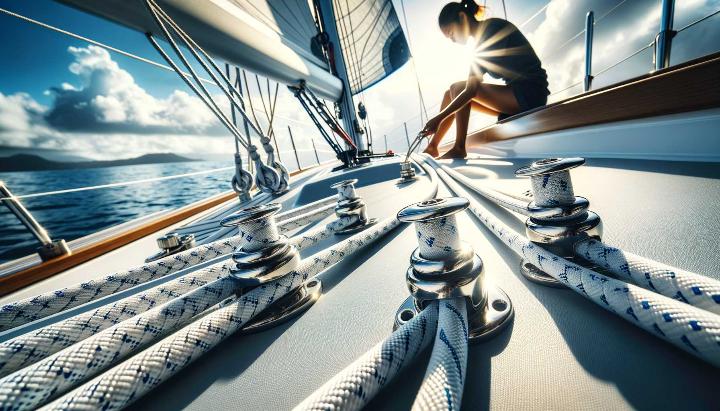Have you ever wondered why choosing the right marine rope can make or break your nautical adventure? In the world of seafaring, the difference between a smooth sail and a potential disaster often comes down to the strength and reliability of your ropes. As a leading manufacturer of high-quality ropes, iRopes understands the critical role that marine ropes play in various applications, from yachting to offshore industries.
In this comprehensive guide, we'll dive into the fascinating world of marine ropes, focusing on three game-changing materials: braided polyester line, braided nylon mason line, and spectra line rope. Each of these materials brings unique properties to the table, revolutionising the way we approach maritime challenges.
Whether you're a seasoned sailor, a professional in the marine industry, or simply curious about the latest advancements in rope technology, this exploration will shed light on why these materials are making waves in the world of marine ropes. Join us as we unravel the strengths, applications, and innovations behind these remarkable rope materials, and discover how they can elevate your maritime experiences to new heights.
Understanding Braided Polyester Line: Properties and Applications
When it comes to marine ropes, braided polyester line stands out as a versatile and reliable choice. As a seasoned sailor, I've had my fair share of experiences with various rope materials, and I can confidently say that braided polyester has become a staple in my maritime adventures.
Braided polyester line is crafted by interweaving multiple strands of polyester fibres, resulting in a strong and durable rope that can withstand the harsh conditions of marine environments. The braided construction gives the rope its distinctive appearance and contributes to its impressive performance characteristics.
Strength and Durability of Braided Polyester Rope
One of the most striking features of braided polyester line is its exceptional strength-to-weight ratio. I remember a particularly challenging sailing expedition where our braided polyester rigging held strong against relentless winds and choppy seas. This experience highlighted the rope's impressive tensile strength, which often surpasses that of traditional natural fibre ropes.
- UV resistance: Polyester's inherent resistance to ultraviolet rays ensures the rope maintains its integrity even after prolonged exposure to sunlight.
- Abrasion resistance: The tight braided construction provides excellent protection against wear and tear, making it ideal for applications involving frequent friction.
- Moisture resistance: Unlike some natural fibres, polyester doesn't absorb water, maintaining its strength and preventing rot or mildew growth.
Stretch Characteristics and Performance
Another aspect that sets braided polyester line apart is its low stretch properties. This characteristic is particularly valuable in applications where maintaining tension is crucial. I once used a braided polyester line for a sail's control system, and the minimal stretch allowed for precise adjustments and enhanced overall performance.

The low stretch quality of braided polyester line offers several advantages:
- Improved control: Minimal elongation allows for more precise adjustments in rigging and other marine applications.
- Energy efficiency: Less energy is lost to rope stretch, resulting in more efficient power transmission.
- Dimensional stability: The rope maintains its shape and length over time, ensuring consistent performance.
Comparing Braided Polyester to Other Synthetic Ropes
While braided polyester line excels in many areas, it's essential to understand how it compares to other synthetic rope materials. For instance, nylon ropes offer higher stretch and shock absorption, which can be beneficial in certain scenarios. However, polyester's lower stretch and superior UV resistance often make it the preferred choice for many marine applications.
In my experience, braided polyester line strikes an excellent balance between strength, durability, and performance. Whether you're rigging a sailboat, securing cargo, or setting up mooring lines, this versatile rope material is sure to meet your needs with flying colours.
Have you used braided polyester line in your maritime adventures? I'd love to hear about your experiences and how it compared to other rope materials you've worked with.
Exploring the Versatility of Braided Nylon Mason Line
As we dive deeper into the world of marine ropes, it's time to shine a spotlight on a true workhorse: the braided nylon mason line. While it might not have the glamorous reputation of some other marine ropes, this versatile tool has earned its stripes in both construction and maritime applications.
Applications and Benefits of Nylon Mason Line
I've seen braided nylon mason line in action across various industries, and its versatility never ceases to amaze me. From construction sites to sailing adventures, this humble rope has proven its worth time and time again.
- Construction powerhouse: On job sites, braided nylon mason line serves as an indispensable guide for bricklaying and concrete work. Its high visibility and ability to maintain a taut line make it perfect for ensuring straight walls and level surfaces.
- Maritime marvel: Out on the water, I've used braided nylon mason line for everything from temporary repairs to creating custom rigging solutions. Its strength and resistance to moisture make it a reliable choice in marine environments.
- Off-road companion: During a recent 4x4 expedition, our braided nylon mason line came in handy for vehicle recovery. Its durability and low stretch properties made it an excellent makeshift tow rope.

The benefits of braided nylon mason line extend far beyond its versatility. Its resistance to moisture, oil, corrosion, and harsh weather conditions make it a reliable choice in challenging environments. Plus, its lightweight nature doesn't compromise its impressive strength, allowing for easy handling without sacrificing performance.
Comparing Braided vs Twisted Mason Line
In my experience, the braided construction of nylon mason line offers several advantages over its twisted counterpart. Let's break down the key differences:
- Superior strength: Braided nylon mason line typically boasts higher tensile strength than twisted versions, making it more suitable for heavy-duty applications.
- Enhanced durability: The braided construction provides better abrasion resistance, extending the life of the rope in high-wear situations.
- Improved handling: I've found that braided lines are generally easier to work with, offering better grip and less tendency to kink or tangle.
When choosing between braided and twisted mason line, consider your specific needs. For precision work in construction or applications requiring maximum strength, I'd recommend opting for the braided variety. However, twisted lines may still have their place in less demanding scenarios or where cost is a primary factor.
Have you used braided nylon mason line in your projects or adventures? I'd love to hear about your experiences and any creative applications you've discovered for this versatile rope.
Discovering the Strength and Durability of Spectra Line Rope
As we dive deeper into the world of marine ropes, we encounter a true game-changer: Spectra line rope. This remarkable material has revolutionised the industry, offering unparalleled strength and durability that surpasses traditional rope materials. Let's explore what makes Spectra line rope so unique and why it's becoming the go-to choice for demanding marine applications. Explore high-performance nylon and braided marine ropes, which are also pivotal in marine applications.
Unmatched Strength: Comparing Spectra to Steel and Other Materials
When I first heard that Spectra fiber is 15 times stronger than steel, I was skeptical. But after witnessing its performance firsthand during a challenging offshore expedition, I became a true believer. The strength-to-weight ratio of Spectra line rope is simply astounding.
- Lightweight powerhouse: Spectra fiber's Ultra-High Molecular Weight Polyethylene (UHMWPE) composition gives it incredible strength while keeping weight to a minimum.
- Superior tensile strength: In breaking strength tests, Spectra consistently outperforms traditional materials like nylon and polyester.
- Minimal stretch: Unlike nylon ropes that can stretch up to 40%, Spectra line rope maintains its length under load, ensuring precise control in critical applications.

Durability and Abrasion Resistance of Spectra Fiber Rope
Beyond its impressive strength, Spectra line rope boasts exceptional durability that sets it apart from other synthetic ropes. During a recent sailing competition, I observed how Spectra lines maintained their integrity even after days of constant use and exposure to harsh marine conditions.
- Unmatched abrasion resistance: Spectra fibers have a slick surface that resists wear, making them ideal for applications involving frequent friction.
- Chemical resistance: Unlike natural fibers, Spectra is impervious to most chemicals, oils, and UV radiation, ensuring longevity in diverse environments.
- Low moisture absorption: Spectra's hydrophobic nature means it doesn't absorb water, maintaining its strength and preventing internal degradation.
These properties make Spectra line rope an excellent choice for long-term marine applications where reliability is crucial. From mooring lines to anchor rodes, Spectra's durability translates to increased safety and reduced maintenance costs. Discover more about how nylon and braided marine ropes offer similar benefits in marine environments.
Have you had any experience with Spectra line rope in your maritime adventures? I'd love to hear how it performed compared to other materials you've used. Share your thoughts in the comments below!
Pro Tip: When selecting Spectra line rope for your marine applications, always consult with a knowledgeable supplier to ensure you choose the right diameter and construction for your specific needs.
Understanding the nuances of marine rope materials is essential for choosing the right line for your seafaring needs. Braided polyester line is known for its durability and low-stretch properties, making it ideal for precise applications and harsh environments. In contrast, braided nylon mason line offers versatility across marine activities with its superior strength and lightweight design. Meanwhile, spectra line rope shines with unmatched tensile strength, outperforming conventional ropes in demanding applications. Each type has its unique advantages suited for specific conditions, allowing for tailored solutions in marine environments.
Get in Touch for Your Custom Marine Rope Needs
Fill out the form above to explore customised rope solutions that meet your unique maritime requirements. Our experts at iRopes will guide you in selecting the perfect rope materials to enhance your marine endeavours.
```